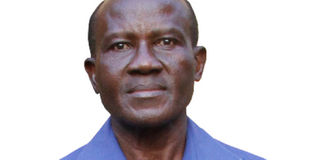Corruption: Lt Col Nakalema cries to churches; let IGG try nsenene clan

I had not tuned into Deputy Inspector General of Government (IGG) George Bamugemereire’s Thursday 6am talk-show appearance on Impact FM for two months. On September 17, I did. As expected, he was avoiding the minefield between the rotten State and his personal decency.
Although appointed by the President, the IGG and her deputy have received very few kind words from the chief, and State House recently created another anti-corruption outfit, headed by Lt Col Edith Nakalema. To add to the complication, some of the President’s media functionaries immediately denounced Nakalema as evil. So, the new anti-corruption warrior, too, cannot feel entirely confident.
Not long ago, Lt Col Nakalema called on religious leaders to partner with her, to fight corruption by shaping Ugandans into honest people.
I instantly understood that the warrior had surrendered – more or less. So I was surprised when Deputy IGG Bamugemereire extolled this new partnership.
Unless his overflowing enthusiasm was a shower of irony, Bamugemereire should have remembered that there is no serious 21 Century government that expects churches to fight corruption.
Indeed, it sounds counter-intuitive, but in vampire states, the churches easily become part of the problem. The often wrongly assumed morality of church people (shepherds and followers) is a perfect mask for hiding criminality.
Bamugemereire recalled a Scandinavian friend, who told him that it had taken Sweden and Denmark 150 years to build societies in which integrity, transparency, and accountability were the norm.
Now, the Scandinavians are not big on religious worship. Church attendance in Sweden is four per cent of the population. In two centuries, Sweden’s population has increased from 1.7 million to 6.8 million people, but the number of priests has not increased. In Denmark, church attendance is a more miserable 2.4 per cent.
Nakalema’s ‘solution’ is a distraction. Another common distraction is that Ugandans are thieves because they were badly brought up by their parents.
The truth the Deputy IGG evaded is that the NRM leadership has woven corruption in its fabric of power.
Small leaders look up at their superiors and see thieves. Ordinary people look up at the small leaders and see thieves, who have learned from their superiors. In some circles, an honest member becomes an outcast. Vote thieves in Uganda know the fraudulent presidential elections the Supreme Court has upheld. Why should they not cheat at the NRM primaries?
The Scandinavians have gone 150 years striving for integrity and social justice. We have done 58 years (since independence) with leaders priding in violence, political intrigue and amassing stolen wealth.
Listening to characters like MP James Kakooza and RDC Fred Bamwine parroting on radio the poisonous doctrine that a ruling party/group/entity has an obligation (to use any means) to retain power, you get a picture of our 58-year progress. And it is on secular stations like Simba FM and CBS FM where you hear these men seriously challenged. On Pentecostal (supposedly Christian) platforms, the moral emptiness of their doctrine is largely endorsed.
In the Bamugemereire show, a listener sent an SMS and noted that the corrupt, if they have power and money, are knowingly hosted and given preferential positions in church congregations (instead of being ostracised). The listener said he belonged to the Ganda Nsenene (grasshopper) clan. Freely, he did not degrade himself or shame his clan by eating nsenene.
So, under the NRM culture of corruption, it may be easier to uphold one’s integrity by a totemic code than to make corruption a forbidden evil using the power of prayers.
Mr Tacca is a novelist, socio-political commentator.
[email protected]


